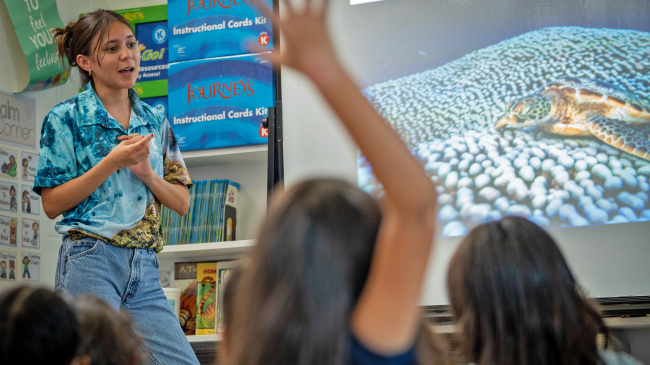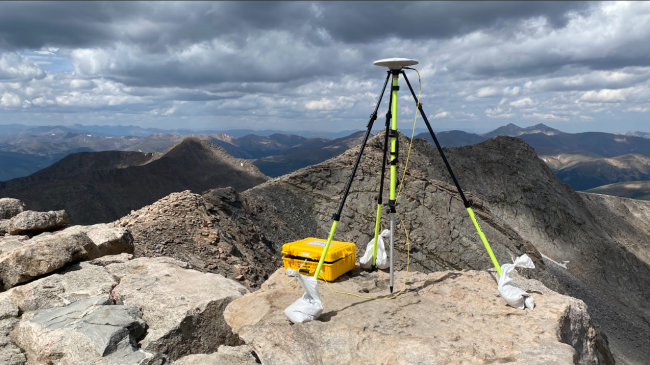Homes along the Mendenhall River near Juneau, Alaska, were damaged and the river bank eroded during unprecedented flooding in August 2023, caused when a glacial lake on a tributary burst through an ice dam. Climate warming has led in increasing extreme weather events in Alaska and the Arctic. (Image credit: Aaron Jacobs/ NOAA National Weather Service)
NOAA scientists will participate in three press events to highlight climate change at the upcoming American Geophysical Union Fall Meeting offsite link in San Francisco.
- Tuesday, Dec. 12, 10 a.m. PT: NOAA 2023 Arctic Report Card. NOAA Administrator Rick Spinrad, Ph.D., kicks off a panel of experts to present the 2023 Arctic Report Card, an annual report that documents new records showing that human-caused warming of air, ocean and land is affecting people, ecosystems and communities across the Arctic region. This year’s report card also includes information about how elevating the use of Indigenous observations, perspectives and knowledge can help identify strategies for climate adaptation. The expert panel includes Rick Thoman, lead editor of the report card, and Thomas Ballinger, Ph.D., co- author of air temperature and precipitation chapters, both of the International Arctic Research Center, University of Alaska Fairbanks; Daniel Schindler, Ph.D., University of Washington, co-author of a chapter on climate impacts on salmon, and Roberta Tuurraq Glenn-Borade, co-author of a chapter on the Alaska Arctic Observing and Knowledge Hub, a network of coastal Indigenous observers who work with the University of Alaska to document environmental change.
- Wednesday, Dec. 13, at 11 a.m. PT: Marine carbon dioxide removal research, applications and ethics. Marine carbon dioxide removal aims to increase the role that the ocean already plays in removing carbon dioxide from the atmosphere. Carbon dioxide removal is now considered an essential strategy by the Intergovernmental Panel on Climate Change for limiting global warming to 1.5° Celsius. But despite the ocean’s large potential for carbon removal, many questions remain about the feasibility, efficacy and potential consequences of attempting to conduct large-scale projects to enhance the ocean’s carbon dioxide absorption. A panel of experts will discuss recent advances in public and private research on marine carbon dioxide, explore some ethical considerations and describe a pilot project underway in the Pacific Northwest. NOAA Assistant Administrator for Research Steve Thur, Ph.D., will lead a panel of experts, which includes Lisa Graumlich, Ph.D., President of AGU: Gabriella Kitch, Ph.D., NOAA’s program lead for marine carbon dioxide; Rory Jacobson, Senior Advisor for Deployment at the Department of Energy; and Matt Eisaman, Ph.D., Chief Scientist and Co-Founder of Ebb Carbon, a startup company developing a marine carbon dioxide removal pilot project in Sequim, Washington.
- Thursday, Dec. 14, at 1:30 PM PT: Roundtable on how to use the Fifth United States National Climate Assessment Atlas. Experts from NOAA, Esri and the US Global Change Research Program (USGCRP) will demonstrate how to use this new online tool designed to help the public, journalists, community managers and adaptation experts map future climate impacts for local regions. The roundtable will include Allison Crimmins, Director of the Fifth National Climate Assessment, Frank Niepold; Senior Climate Education Program Manager for NOAA’s Climate Program Office and Dan Pisut, Environmental Information and Climate Resilience lead at Esri.
How to attend press events in person or virtually

AGU’s Annual Meeting is free offsite link for all journalists who attend in person or virtually.
Reporters attending in person and remotely will have access to all press conferences and roundtables, but must register in advance. To register, go to the Annual Meeting Press Center offsite link and click on the purple “Register” button. Media will be prompted to log in to their existing AGU account, or create a new AGU account, before registering. Registration will remain open throughout the conference.
Reporters will be able to access press events and scientific talks in real-time through the online meeting platform from the AGU Annual Meeting website offsite link by clicking the purple "Log into AGU23" button. They will need the email and password they created during press registration.
Press events will be held at the Moscone Convention Center, 747 Howard Street in Moscone South, Level 3, Press Room 306-307.
Please go to the Press Center for a full list of all AGU press events.
Media contact
Monica Allen, (202) 379-6693, monica.allen@noaa.gov



